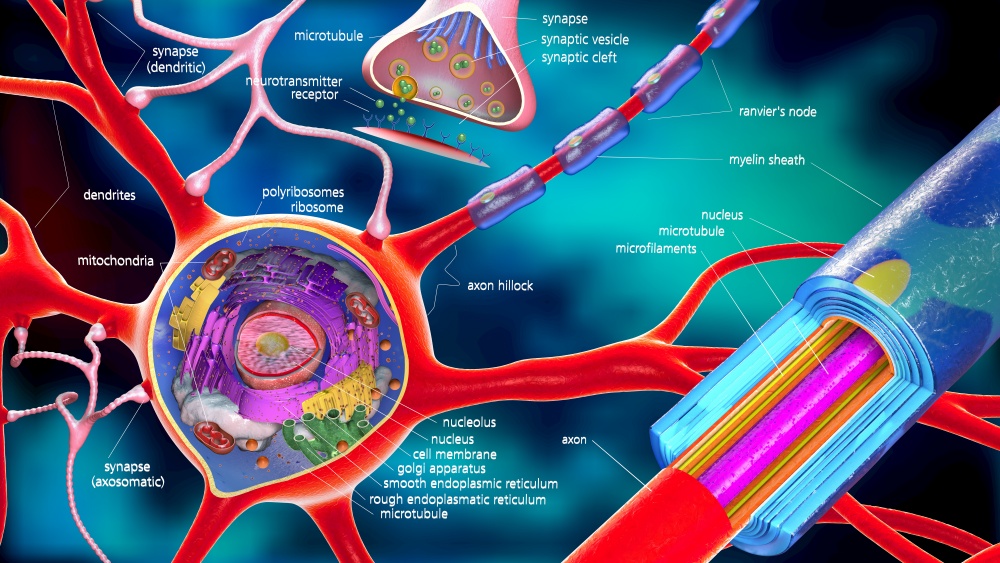Within every cell of the human body is a pool of structures called mitochondria, often referred to as the “powerhouse” of the cell (generating 90% of the body’s energy). In recent years mitochondria have been credited for brain health and optimal performance.
On the other hand, mitochondrial dysfunction has been linked to a number of degenerative diseases including multiple sclerosis, Parkinson’s disease, ALS, and Alzheimer’s disease. In addition to degenerative diseases, mitochondrial dysfunction has been associated with diabetes, depression, anxiety, obesity, and ADHD. As well as age-related impairments including memory, vision, hearing, attention, and cognition.
With that said, in this article, we are going to do a deep dive into the structure and function of this critical structure.
What are mitochondria?
Mitochondria are oval-shaped structures (organelles) located within every cell in the human body. The main function of these oval-shaped structures is to produce energy.
Mitochondria are the energy producers of the cell
Glucose enters the cell and is broken down before it enters the mitochondria. Once inside the mitochondria, the dismembered glucose molecule is converted into energy called adenosine triphosphate (ATP). This process is called oxidative phosphorylation (OXPHOS).
Fatty acids are also converted to ATP in the mitochondria via the same process but do not need to be broken down before entering the mitochondria.
Oxidative phosphorylation (OXPHOS) is responsible for powering almost every cellular operation including muscle contraction (movement) and brain function.
The number of mitochondria within each cell varies depending on the energy requirements. For example, nerve cells (neurons) in the brain have a high concentration of mitochondria given the high energy requirement of brain tissue.
Reactive Oxygen Species: A byproduct of energy production
During this “energy-making process”, mitochondria release reactive oxygen species (ROS), a type of free radical. ROS is an unstable molecule with one unpaired electron. To become a stable molecule ROS must either steal an electron or give one away thus making another molecule unstable. In excess, ROS has the potential to cause damage. To prevent ROS from damaging the cell, there is something called the antioxidant defense system. The antioxidant defense system neutralizes these unstable molecules into “non-threatening” molecules. And all is right with the world 😊
Unfortunately, the antioxidant defense system is not limitless in its potential and if too much ROS is produced this can create an imbalance and will result in something called oxidative stress
What is oxidative stress?
Oxidative stress is occurs when the antioxidant defense system is unable to keep up with the production of ROS. This excess production of free radicals (ROS) can damage the cell’s DNA, lipids, and proteins. Oxidative stress also creates problems in the mitochondria causing less energy (ATP) production and overproducing ROS. I liken this to an old car where the car becomes “less efficient” and produces more exhaust.
Hence, oxidative stress is implicated in a variety of diseases.
Other mitochondrial functions
In addition to producing energy, mitochondria store calcium for cell signaling, generate heat, and mediate cell growth and death.
How do mitochondria maintain optimal performance and brain health?
Given the importance of mitochondria on cellular operations, there are mechanisms in place to ensure these vital structures are functioning at full capacity. The 3 processes are called fission, fusion, and mitochondrial biogenesis (making new mitochondria).
When a part of a mitochondria becomes weak or damaged, that part of the mitochondria is cut off and disposed. This process is called fission.
When a mitochondrion is “slowing down” or becoming less efficient, it will join another “aging mitochondria” through a process called fusion.
And no mitochondria will live forever and therefore, there is a process of creating new mitochondria called mitochondrial biogenesis.
Individuals with higher concentration of mitochondria have more energy and are overall healthier. For example, children have an extremely high concentration of mitochondria and are typically bundles of energy. On the other hand, older adults have fewer mitochondria, less energy, and higher prevalence of disease.
You may also be interested in one of these articles:
Don’t judge a book.
“Judging others is bad”. Don’t judge a book by it’s cover. From our earliest age we are taught not to “judge” people. My definition of “judging” is when an opinion about someone is attached to a “value”. “Good people” and “Bad people”. “Good behavior” and “bad...
Strategy over “strength”
I am a “fixer”. I see problems or potential problems and I immediately jump in headfirst to “fix” said problem. I can also sometimes be an “avoider”. Look ahead to avoid potential problems. Finally, and most importantly, I am NOT a “tread-er.” Rarely do I find it...
Don’t believe your lying eyes
If you want to change an area of your life, start with the smallest habit you can consistently do to move you in that direction. Seeing is believing. Personally, this strategy has been effective with fitness, academic, and business goals. If you want to run a...
The tail of two nails
Whether you believe it to be true or false, you are right. A british journal published a case of a construction worker who jumped off a plank landing on a nail that punctured straight through his shoe emerging on the other side. In terrible pain, the man was sedated...
When “fantacy” overshadows reality
When was the last time you remember having to think about how to retrieve a glass of water from a table? If you are a healthy adult, probably never. You see, there are skills that require “motor planning”. However, most activities of daily living are automatic. That...
Why you strive for more
Health is the greatest gift; Contentment is the greatest wealth - Siddhartha Gautama Feeling a little bit of discontentment is an extremely effective motivation to move toward a specific goal. Folks with financial “wealth” will often credit their drive to growing up...
Choose your gemstones
Feeling frustrated by your lack of progress? If so, you are on the right track. BIG things are about to happen. Frustration is a sense of discouragement, anger, and annoyance because of unresolved problems or unfulfilled goals, desires, or needs. I don’t like feeling...
Why do you do what you do?
Why do we do what we do? “Good” behavior or “bad”, if progress is a high priority, it’s an essential question. Are you doing what you need to do to make progress? If not, you aren’t alone. I think we have all had a time in our lives when we lacked confidence in our...
Secret to win the game of life
"Just look on the brite side". I was recently watching a self-proclaimed “optimist” teach about all the benefits of optimism. His second most jarring statement was something like, “You must be an optimist to succeed.” I will “circle back” to number one....
Routines are overrated
What would I be without my routine...... Some days I arrive at my office and can’t really remember much about the trip. My “autopilot” is something I appreciate. My drive allows me time each day to think through a problem and/or a solution to a problem. As a...











